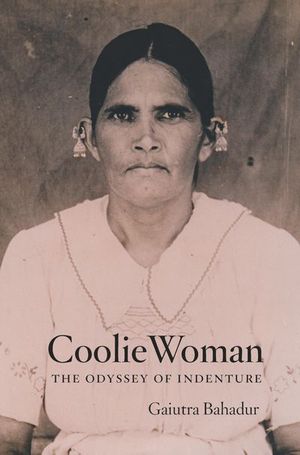Coolie Woman
Shortlisted for the Orwell Prize: “[Bahadur] combines her journalistic eye for detail and story-telling gifts with probing questions . . . a haunting portrait.” —The Independent
In 1903, a young woman sailed from India to Guiana as a “coolie” —the British name for indentured laborers who replaced the newly emancipated slaves on sugar plantations all around the world. Pregnant and traveling alone, this woman, like so many coolies, disappeared into history. Now, in Coolie Woman, her great-granddaughter embarks on a journey into the past to find her.
Traversing three continents and trawling through countless colonial archives, Gaiutra Bahadur excavates not only her great-grandmother’s story but also the repressed history of some quarter of a million other coolie women, shining a light on their complex lives. Shunned by society, and sometimes in mortal danger, many coolie women were runaways, widows, or outcasts. Many left husbands and families behind to migrate alone in epic sea voyages—traumatic “middle passages” —only to face a life of hard labor, dismal living conditions, and, especially, sexual exploitation. As Bahadur explains, however, it is precisely their sexuality that makes coolie women stand out as figures in history. Greatly outnumbered by men, they were able to use sex with their overseers to gain various advantages, an act that often incited fatal retaliations from coolie men and sometimes larger uprisings of laborers against their overlords. Complex and unpredictable, sex was nevertheless a powerful tool.
Examining this and many other facets of these remarkable women’s lives, Coolie Woman is a meditation on survival, a gripping story of a double diaspora—from India to the West Indies in one century, Guyana to the United States in the next—that is at once a search for roots and an exploration of gender and power, peril and opportunity.
In 1903, a young woman sailed from India to Guiana as a “coolie” —the British name for indentured laborers who replaced the newly emancipated slaves on sugar plantations all around the world. Pregnant and traveling alone, this woman, like so many coolies, disappeared into history. Now, in Coolie Woman, her great-granddaughter embarks on a journey into the past to find her.
Traversing three continents and trawling through countless colonial archives, Gaiutra Bahadur excavates not only her great-grandmother’s story but also the repressed history of some quarter of a million other coolie women, shining a light on their complex lives. Shunned by society, and sometimes in mortal danger, many coolie women were runaways, widows, or outcasts. Many left husbands and families behind to migrate alone in epic sea voyages—traumatic “middle passages” —only to face a life of hard labor, dismal living conditions, and, especially, sexual exploitation. As Bahadur explains, however, it is precisely their sexuality that makes coolie women stand out as figures in history. Greatly outnumbered by men, they were able to use sex with their overseers to gain various advantages, an act that often incited fatal retaliations from coolie men and sometimes larger uprisings of laborers against their overlords. Complex and unpredictable, sex was nevertheless a powerful tool.
Examining this and many other facets of these remarkable women’s lives, Coolie Woman is a meditation on survival, a gripping story of a double diaspora—from India to the West Indies in one century, Guyana to the United States in the next—that is at once a search for roots and an exploration of gender and power, peril and opportunity.
BUY NOW FROM
COMMUNITY REVIEWS

